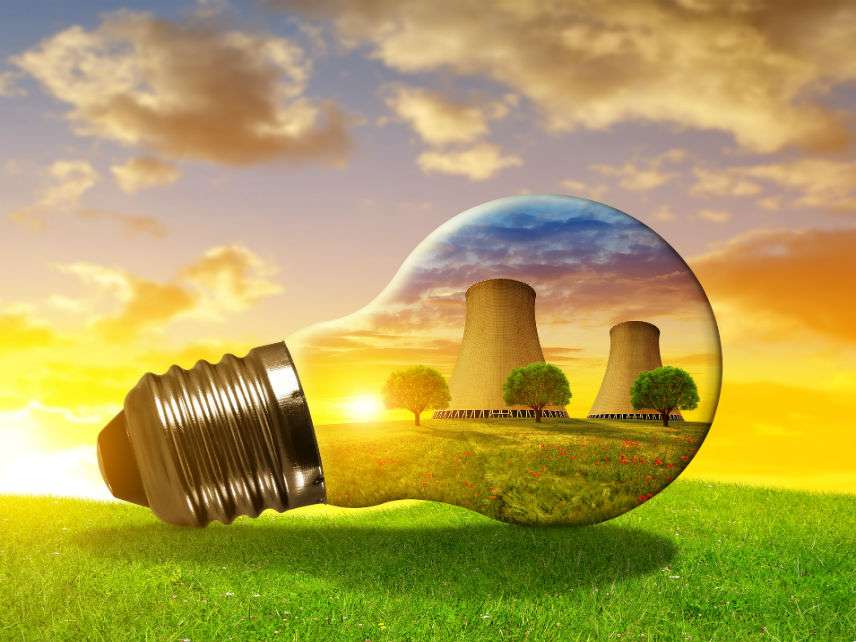Union of Concerned Scientists For Nukes!
Activist group finally recognizes that it can't achieve its energy and climate goals without nuclear power.

The activists at the Union of Concerned Scientists (UCS) have had a partial change of heart about nuclear power. Back in 2007, the UCS' Global Warming and Nuclear Power report declared, "prudence dictates that we develop as many options to reduce global warming emissions as possible, and begin by deploying those that achieve the largest reductions most quickly and with the lowest costs and risk. Nuclear power today does not meet these criteria."
In its new report, The Nuclear Power Dilemma, the UCS now recognizes that nuclear power plays an important role in addressing the problem of man-made global warming by helping to keep U.S. carbon dioxide emissions considerably lower than they would otherwise be. The UCS notes that there has been a 28 percent reduction in U.S. power-sector emissions of carbon dioxide below 2005 levels. This is largely due to the switch from coal to cheap fracked natural gas, to increased energy efficiency, and to the deployment of some solar and wind generation capacity.
The UCS fears that this trend toward lower carbon dioxide emissions will be derailed because many of the currently operating nuclear power plants will close because they are being outcompeted by generation facilities fueled by cheap natural gas and subsidized renewable power generation. "More than one-third of existing plants, representing 22 percent of total U.S. nuclear capacity, are unprofitable or scheduled to close," notes the report. "The possibility that the nation will replace existing nuclear plants with natural gas and coal rather than low-carbon sources raises serious concerns about our ability to achieve the deep cuts in carbon emissions needed to limit the worst impacts of climate change." The UCS has evidently come to realize that closing down nuclear power plants will perversely "lock-in" fossil fuels and thus make it harder and more expensive to "save the climate."
In order to avoid this outcome the UCS advocates either raising the price of electricity generated from burning fossil fuels by putting a price of $25 per ton on carbon dioxide emissions (to be increased at 5 percent annually) or adopting a steadily rising national low-carbon electricity standard. The UCS favorably cites the subsidy schemes adopted by New York, New Jersey and Illinois to keep open nuclear power plants outcompeted by natural gas and subsidized renewable energy generators.
Of course, the UCS's mild embrace of nuclear power has provoked criticism by some progressives. Gregory Jaczko, former chairman of the Nuclear Regulatory Commission during the Obama administration, said to ThinkProgress that nuclear reactors "are a bad bet for a climate strategy." Why? Because the costs of building nuclear power plants have risen steeply over the years.
Sadly, it should be noted that the UCS itself has been a loud cheerleader for the very over-regulation that led to the steadily rising costs for deploying new nuclear power plants. In 2017 Australian National University researcher Peter Lang calculated that had the trend of rapidly falling costs and accelerating deployment of nuclear plants in the 1960s and 1970s been allowed to continue, nuclear power could now be around 10 percent of its current cost. Such low cost nuclear power by 2015 could have replaced worldwide up to 100 percent of coal-generated and up to 76 percent of gas-generated electricity. In other words, in an alternative world without the regulatory obstructionism practiced by environmental activists, humanity would already be well on the way toward mitigating the problem of man-made global warming.
It's welcome news that the UCS has taken this small step towards recognizing the value of low-carbon nuclear power. It would be even better if the activist group would also come around to advocating the rapid development and deployment of new safer nuclear power generation technologies, such as molten salt thorium reactors, small modular reactors, and traveling wave reactors.
Show Comments (84)